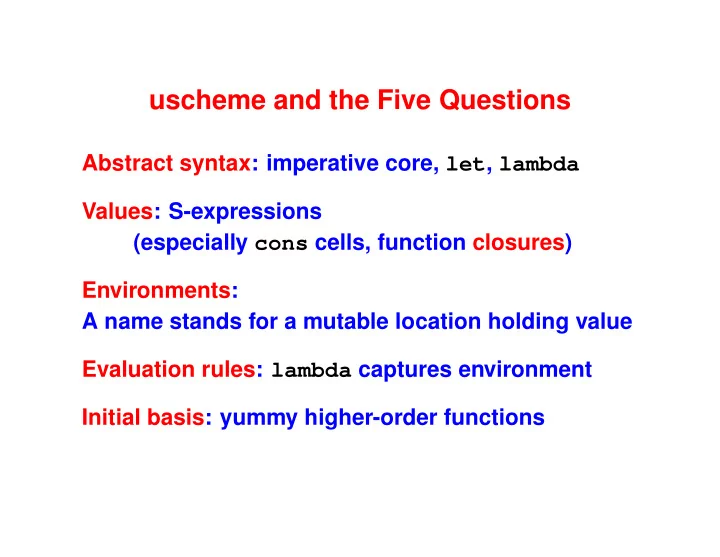

uscheme and the Five Questions Abstract syntax: imperative core, let , lambda Values: S-expressions (especially cons cells, function closures) Environments: A name stands for a mutable location holding value Evaluation rules: lambda captures environment Initial basis: yummy higher-order functions
Real Scheme: Macros A Scheme program is just another S-expression • Function define-syntax manipulates syntax at compile time • Macros are hygienic—name clashes impossible • let , and , many others implemented as macros
Real Scheme: Conditionals (cond (c1 e1) ; if c1 then e1 (c2 e2) ; else if c2 then e2 ... ... (cn en)) ; else if cn then en ; Syntactic sugar---’if’ is a macro: (if e1 e2 e3) == (cond (e1 e2) (#t e3))
Real Scheme: Mutation Not only variables can be mutated. Mutate heap-allocated cons cell: (set-car! ’(a b c) ’d) => (d b c) Circular lists, sharing, avoids allocation • still for specialists only
Length fun length [] = 0 | length (x::xs) = 1 + length xs val res = length [1,2,3]
Map fun map f [] = [] | map f (x::xs) = (f x) :: (map f xs) val res1 = map length [[], [1], [1,2], [1,2,3]]
Map, without redundant parentheses fun map f [] = [] | map f (x::xs) = f x :: map f xs val res1 = map length [[], [1], [1,2], [1,2,3]]
Filter fun filter pred [] = [] | filter pred (x::xs) = (* pred? not legal *) let val rest = filter pred xs in if pred x then (x::rest) else rest end val res2 = filter (fn x => (x mod 2) = 0) [1,2,3,4] (* Note fn x => e is syntax for lambda in SML *)
Filter, without redundant parentheses fun filter pred [] = [] | filter pred (x::xs) = (* no ’pred?’ *) let val rest = filter pred xs in if pred x then x :: rest else rest end val res2 = filter (fn x => (x mod 2) = 0) [1,2,3,4]
Exists fun exists pred [] = false | exists pred (x::xs) = (pred x) orelse (exists pred xs) val res3 = exists (fn x => (x mod 2) = 1) [1,2,3,4]
Exists, without redundant parentheses fun exists pred [] = false | exists pred (x::xs) = pred x orelse exists pred xs val res3 = exists (fn x => (x mod 2) = 1) [1,2,3,4]
All fun all pred [] = true | all pred (x::xs) = (pred x) andalso (all pred xs) val res4 = all (fn x => (x >= 0)) [1,2,3,4]
All, without redundant parentheses fun all pred [] = true | all pred (x::xs) = pred x andalso all pred xs val res4 = all (fn x => (x >= 0)) [1,2,3,4]
Take exception ListTooShort fun take 0 l = [] | take n [] = raise ListTooShort | take n (x::xs) = x::(take (n-1) xs) val res5 = take 2 [1,2,3,4] val res6 = take 3 [1] handle ListTooShort => (print "List too short!"; []) (* Note use of exceptions. *)
Take, without redundant parentheses exception TooShort fun take 0 _ = [] (* wildcard! *) | take n [] = raise TooShort | take n (x::xs) = x :: take (n-1) xs val res5 = take 2 [1,2,3,4] val res6 = take 3 [1] handle TooShort => (print "List too short!"; []) (* Note use of exceptions. *)
Drop fun drop 0 l = l | drop n [] = raise ListTooShort | drop n (x::xs) = (drop (n-1) xs) val res7 = drop 2 [1,2,3,4] val res8 = drop 3 [1] handle ListTooShort => (print "List too short!"; [])
Takewhile fun takewhile p [] = [] | takewhile p (x::xs) = if p x then (x::(takewhile p xs)) else [] fun even x = (x mod 2 = 0) val res8 = takewhile even [2,4,5,7] val res9 = takewhile even [3,4,6,8]
Takewhile, without redundant parentheses fun takewhile p [] = [] | takewhile p (x::xs) = if p x then x :: takewhile p xs else [] fun even x = (x mod 2 = 0) val res8 = takewhile even [2,4,5,7] val res9 = takewhile even [3,4,6,8]
Drop while fun dropwhile p [] = [] | dropwhile p (zs as (x::xs)) = if p x then (dropwhile p xs) else zs val res10 = dropwhile even [2,4,5,7] val res11 = dropwhile even [3,4,6,8] (* fancy pattern form: zs as (x::xs) *
Dropwhile, without redundant parentheses fun dropwhile p [] = [] | dropwhile p (zs as (x::xs)) = if p x then dropwhile p xs else zs val res10 = dropwhile even [2,4,5,7] val res11 = dropwhile even [3,4,6,8] (* fancy pattern form: zs as (x::xs) *)
Folds fun foldr p zero [] = zero | foldr p zero (x::xs) = p (x, (foldr p zero xs)) fun foldl p zero [] = zero | foldl p zero (x::xs) = foldl p (p (x, zero)) xs val res12 = foldr (op +) 0 [1,2,3,4] val res13 = foldl (op * ) 1 [1,2,3,4] (* Note ’op’ to use an infix operator as a value. *)
Folds, without redundant parentheses fun foldr p zero [] = zero | foldr p zero (x::xs) = p (x, foldr p zero xs ) fun foldl p zero [] = zero | foldl p zero (x::xs) = foldl p (p (x, zero)) xs val res12 = foldr (op +) 0 [1,2,3,4] val res13 = foldl (op * ) 1 [1,2,3,4] (* Note ’op’ to use infix operator as a value *)
ML—The Five Questions Syntax: definitions, expressions, patterns, types Values: num/string/bool, record/tuple, algebraic data Environments: names stand for values (and types) Evaluation: uScheme + case and pattern matching Initial Basis: medium size; emphasizes lists (Question Six: type system—a coming attraction)
Recommend
More recommend